Stories about...Teacher Professional Development
 CISTEME365 Provides Year-Round PD/Community to Illinois Teachers in Support of Informal STEM Education Efforts to Underserved Students
CISTEME365 Provides Year-Round PD/Community to Illinois Teachers in Support of Informal STEM Education Efforts to Underserved Students
January 4, 2021
As part of its year-round emphasis, CISTEME365 (Catalyzing Inclusive STEM Experiences All Year Round) held an all-day professional development (PD) session on Wednesday, December 2nd, for educators from eight participating schools. An initiative of the University of Illinois’ Grainger College of Engineering, in partnership with NAPE (the National Alliance for Partnerships in Equity), CISTEME365 provided the PD session via Zoom, incorporating videos and printed materials, as well as using materials from kits that had been mailed participants. The goal of the session was to provide educators with equity/inclusion training, plus allow them to experience for themselves hands-on, project-based learning activities prior to having the students in their clubs try them out.
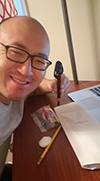 CISTEME365 Virtual Institute Equips Teachers to Expose Underserved Students to STEM Via Extracurricular STEM Clubs
CISTEME365 Virtual Institute Equips Teachers to Expose Underserved Students to STEM Via Extracurricular STEM Clubs
July 31, 2020
For five days during the period from July 20–30, CISTEME365 (Catalyzing Inclusive STEM Experiences All Year Round), a three-year, NSF-funded program in its second year, held its summer 2020 CISTEME365 Virtual Institute. Its goal? To equip educators to give students quality informal learning opportunities outside of the classroom. The idea was for teams from eight different schools to form or bolster already-existing clubs that pique the interest of under-represented students in STEM (Science, Technology, Engineering, and Math), with the long-term goal of increasing the diversity in STEM.
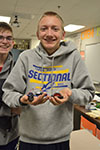 MSHS STEM Club Seeks to Pique High Schoolers’ Interest in STEM Via Hands-on Activities, Exploring STEM Careers
MSHS STEM Club Seeks to Pique High Schoolers’ Interest in STEM Via Hands-on Activities, Exploring STEM Careers
December 17, 2019
What’s something that teenagers might find so exciting that they’d roust themselves out of bed early on a Monday morning in order to show up at school by 7:15 AM? STEM! To be specific, the Mahomet-Seymour High School (MHSH) STEM Club, which has met every Monday morning since it was begun in late August, exposing between 15–25 young people to STEM hands-on activities and STEM careers each week.
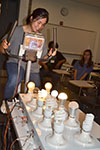 Banerjee and Bose Empower/Recharge Educators During CISTEME365 Session About Power and Energy
Banerjee and Bose Empower/Recharge Educators During CISTEME365 Session About Power and Energy
September 16, 2019
In the recent CISTEME365 Institute from July 22–August 3, 2019, two rising stars in Electrical and Computer Engineering (ECE), Assistant Professors Subhonmesh Bose and Arijit Banerjee, presented a session on their areas of research—power and energy— to 13 educators participating in the institute. Part of the 3-year NSF grant, Catalyzing Inclusive STEM Experiences All Year Round CISTEME365, their integrated presentation walked through a history of power systems, the physics behind electromechanical energy conversion, and shared research frontiers in power and energy. Plus, a dialogue ensued where both the K–12 and higher education teachers discussed STEM pedagogy beneficial for all ages.
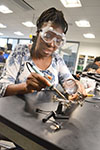 Five Schools Tap into CISTEME365 Resources to Begin STEM Clubs, Pique Student Interest in STEM
Five Schools Tap into CISTEME365 Resources to Begin STEM Clubs, Pique Student Interest in STEM
September 12, 2019
With the goal of increasing the number of their students, especially girls and minorities, who become interested in, and possibly choose careers in STEM (Science, Technology, Engineering, and Mathematics), 13 teachers from five schools are participating in Electrical and Computer Engineering’s new NSF-funded grant, CISTEME365 (Catalyzing Inclusive STEM Experiences All Year Round). The main objective of the program is for the educators to begin after-school STEM clubs in their schools. As part of the program, for two weeks this past summer, from July 22–August 3, 2019, the schools sent Idea Teams to campus for the first CISTEME365 Institute. There, the educators learned how to foster equity and inclusion, tried out hands-on activities that would expose students in their clubs to STEM, and networked with other educators excited about STEM.
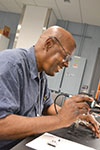 CISTEME365 Seeks to Increase Underrepresented in STEM—Trains Teachers to Start STEM Clubs
CISTEME365 Seeks to Increase Underrepresented in STEM—Trains Teachers to Start STEM Clubs
September 10, 2019
According to statistics, women and minorities are underrepresented in STEM (Science, Technology, Engineering, and Math). So, for years, Electrical and Computer Engineering (ECE) Professor Lynford Goddard has been exposing high school girls, including minorities, to electrical engineering via cutting-edge-yet-fun hands-on activities in his GLEE (Girls Learn Electrical Engineering) camp, which, to foster inclusion, included boys as well this past summer. Now, he hopes to significantly increase the number of high schoolers he impacts annually from the 21 or so he’s been working with in GLEE, to significantly more than that—at least 1,000—through his 3-year NSF grant, Catalyzing Inclusive STEM Experiences All Year Round (CISTEME365). Plus, Goddard hopes to pass on not just some of his expertise, but the materials he’s developed over the years, to teachers who will use what they learn to begin after-school STEM programs.
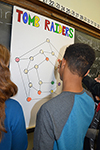 GeoJam Helps Edison Eighth Graders Discover That Mathematics Is Fun
GeoJam Helps Edison Eighth Graders Discover That Mathematics Is Fun
December 20, 2018
On Friday, December 14th, 26 Illinois undergraduate students who intend to one day teach mathematics visited Edison Middle School in Champaign as part of the Curriculum and Instruction (C&I) Department’s annual math outreach, GeoJam. In addition to allowing the school's 220 or so eighth graders to explore a variety of ways that mathematics can be used outside of their math class at school, through the event they discovered that teamwork can be helpful in problem solving. Plus, and probably most importantly, they also learned that math can be fun. This year’s GeoJam was organized by Gloriana Gonzalez, a C&I Professor in Math Education who was helping organize the event for the second year in a row, and C&I instructor Adam Poetzel, whose instructional focus is on the preparation and training of pre-service mathematics teachers to effectively teach diverse K–12 students..
 nano@Illinois RET Teachers Experience Cutting-Edge Nanotechnology Research—Introduce It to Their Students
nano@Illinois RET Teachers Experience Cutting-Edge Nanotechnology Research—Introduce It to Their Students
September 18, 2017
In its fourth and final year, the nano@illinois Research Experience for Teachers (RET), funded by the National Science Foundation, offered eleven P–20 STEM teachers the opportunity to do cutting-edge research in the field of nanotechnology under some of Illinois’ premier researchers in the field. The second emphasis of the RET was for teachers to develop modules related to their research that could be used in their own and other classrooms. The goal of the RET is that, based on teachers’ resulting enthusiasm, content knowledge, and increased familiarity with possible careers in the field, along with the modules they develop, which will be available for use by other teachers as well, a larger number of students will be exposed to the field.
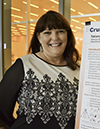 nano@illinois RET's Tatiana Stine Hopes to Help Expose Youngsters to Nanotechnology
nano@illinois RET's Tatiana Stine Hopes to Help Expose Youngsters to Nanotechnology
September 5, 2016
An instructional coach at a local school, Tatiana Stine is passionate about helping her teachers implement the Next Generation Science Standards—especially engineering. A participant in the nano@illinois RET program this past summer, she got to work with innovative nanotechnology while conducting research on graphene. And she not only learned a lot of new things, she developed teaching modules she plans to take back to her teachers. And one day, while waiting for gold nanoparticles to deposit on her device, she came up with a fun and novel way to teach youngsters about nanotechology—Gene the Graphene.
FULL STORY
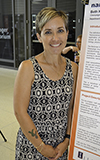 nano@illinois RET Teachers Discover Nanotechnology's Big Impact—Hope Their Students Will Too
nano@illinois RET Teachers Discover Nanotechnology's Big Impact—Hope Their Students Will Too
August 31, 2016
If you get them hooked early, the kids will think graphene is so cool, and that spark could make them the next big nano scientist.” – Tatiana Stine
This summer 11 teachers of varying grade levels and backgrounds participated in the nano@illinois Research Experience for Teachers (RET) funded by the National Science Foundation. While participating in research in a wide range of areas, these teachers’ eyes were opened to the intricate world of nanotechnology and all the possibilities it offers. But while the research is important, that’s not the program's only goal. It is expected that these teachers will then take all that they learned through their research on nanotechnology and, with support from staff and other teachers, translate it into lesson modules they can use with their students back home. It is hoped that as they are able to successfully teach their students what they’ve learned, they’ll not only be exposing them to STEM, but some of its cutting-edge possibilities, like nanotechnology, that their students may never been exposed to before because of a variety of factors, including their socioeconomic background.
FULL STORY
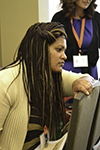 STEM Conference Gives Teachers the Courage—and the Tools—to "Do Science"
STEM Conference Gives Teachers the Courage—and the Tools—to "Do Science"
August 17, 2015
“I have never felt science was my strong suit. But attending this conference and participating in the workshops, it just gives you the courage to go and do science, and have fun with it, and not be afraid of it.” – Brenda Montgomery, Holmes Elementary 1st grade teacher
The 2015 Beginning Teacher STEM Conference on July 28 & 29 did more than impart courage to the approximately 125 new Illinois teachers who attended. The annual event, hosted by the College of Education’s Illinois New Teacher Collaborative (INTC) also equipped them with the know-how and the tools, including a raft of hands-on activities they could take back to their own classrooms.
FULL STORY
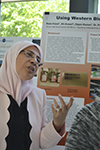 RET Teachers Experience Multidisciplinary Nanotechnology Research via nano@illinois
RET Teachers Experience Multidisciplinary Nanotechnology Research via nano@illinois
August 3, 2015
When the twelve P-20 STEM teachers participating in this summer’s iteration of nano@illinois Research Experience for Teachers (RET) arrived on campus to do research in some of Illinois’ state-of-the-art labs under some of Illinois’ premier researchers, they learned a whole lot about their research topics. And while learning about converting 3D files to DNA brick objects, or receptor differences in cancer cells, or graphene, or that micro cavities can trap light between mirrors, they discovered one overarching fact about nanotechnology research at Illinois: it isn’t all housed in one particular department. While nanotechnology is about things that are really, really small, nanotechnology research on campus is really big and is spread out across numerous disciplines.
FULL STORY
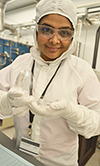 2015 nano@illinois RET Teachers Perform Nanotechnology Research, Make Modules
2015 nano@illinois RET Teachers Perform Nanotechnology Research, Make Modules
August 3, 2015
Funded by the National Science Foundation, the nano@illinois Research Experience for Teachers (RET) offered eleven practicing P-20 STEM teachers and one pre-service teacher the chance to do research under some of Illinois’ premier researchers in their state-of-the-art labs. Over the next year, teachers are then to develop a module related to their nanotechnology research that can be used in their own or other classrooms. According to Program Coordinator Carrie Kouadio, the RET's main goal is “that the students will be impacted and can benefit from the teacher's increased enthusiasm, higher content knowledge, and ability to direct them in considering careers.”
FULL STORY
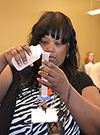 Beginning Teachers Add to Their Hands-On Repertoire at INTC STEM Conference
Beginning Teachers Add to Their Hands-On Repertoire at INTC STEM Conference
July 31, 2014
On July 29–30, 2014, 100+ teachers from all over the state attended the 2nd Annual Beginning Teacher STEM Conference hosted by the Illinois New Teacher Collaborative (INTC). Held at the I-Hotel on campus, the conference targeted new teachers in their first through fourth years of teaching, plus some of their mentors. A total of 150 teachers registered for the conference...
FULL STORY
 Local Biology Teacher to Introduce her Students to Research on Quantum Dots
Local Biology Teacher to Introduce her Students to Research on Quantum Dots
July 10, 2014
“I teach in a very small school with limited resources," says science teacher Aubrey Wachtel, "so one of the best things that I can do is have experiences and then bring them back to the classroom." So this summer, Wachtel is experiencing nanotechnlogy while researching quantum dots."
FULL STORY
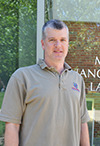 Local Science Teachers Experience Research in NanoTechnology
Local Science Teachers Experience Research in NanoTechnology
July 9, 2014
For the next three years, a number of area science teachers will have an opportunity to participate in the Nano@illinois RET, where they will not only learn about, but actually participate in, cutting edge research in nanotechnology and even adapt some of what they have learned for students in their classrooms.
FULL STORY
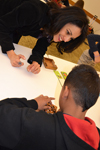 Noyce Scholars: Taking Student-Centered Math to High-Needs Schools
Noyce Scholars: Taking Student-Centered Math to High-Needs Schools
May 14, 2013
"Noyce is probably the best decision I've made professionally, and as far as my college career goes." Liz Denz
Liz Denz has wanted to teach math ever since her freshman year in high school. And Illinois' NSF-funded Noyce program, which provides scholarships for talented mathematics majors who want to become K-12 math teachers, is helping to make her and other Noyce scholars' dreams come true.
FULL STORY
 Noyce: Training Math Teachers Who Foster Equity in the K-12 Classroom
Noyce: Training Math Teachers Who Foster Equity in the K-12 Classroom
May 2, 2013
This is Rochelle Gutiérrez' hope for her Noyce scholars when they finally become K-12 math teachers: that when they look at themselves in the mirror every day, they will be able to say, "I'm doing what I wanted to do when I went into education."
FULL STORY
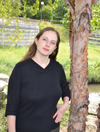 Nano-CEMMS' Carrie Kouadio Finds Teaching Nanotechnology Rewarding
Nano-CEMMS' Carrie Kouadio Finds Teaching Nanotechnology Rewarding
November 6, 2012
The Nano-CEMMS education program seems to have a pattern of offering top-notch educators stimulating science programs as bait, getting them hooked, then reeling them in. For example, the story of how Carrie Kouadio, an integral part of the Center for Nanoscale Chemical-Electrical-Mechanical Manufacturing Systems (Nano-CEMMS) education team ended up there is similar to those of several other members of the team: She was a science teacher who came to Nano-CEMMS to participate in teacher development to improve her skills and liked it so much that she stayed.
FULL STORY
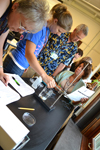 MIST Workshop Trains Teachers in Merit Instructional Style
MIST Workshop Trains Teachers in Merit Instructional Style
August 29, 2012
For three days at the beginning of August, the MIST (Merit Immersion for Students and Teachers) program hosted the MIST Summer Teacher Workshop for 52 high school and community college teachers. After being exposed to training by the directors of Illinois' Merit Program, the teachers returned home armed with new strategies and materials...
FULL STORY
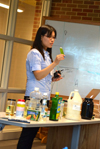 iRISE and Denos Work to Get Students Hooked on Science in Middle School
iRISE and Denos Work to Get Students Hooked on Science in Middle School
July 31, 2012
One of Sharlene Denos' passions is to expose middle school students to hands-on activities in order to pique their interest in science so it becomes a life-long interest—possibly even a career. Denos hopes to give today's middle school student opportunities she didn't have at that age.
FULL STORY
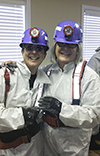 I-STEM Evaluators Visit Coal Mines to Evaluate Coal Education Program
I-STEM Evaluators Visit Coal Mines to Evaluate Coal Education Program
July 10, 2012
Neither rain, nor sleet, nor snow, nor gloom of coal mine can keep an evaluator from her appointed rounds.
With this slight adaptation, the mail carrier's creed might apply to the dedication of I-STEM evaluators. For instance, Lizanne DeStefano, the Director of I-STEM rode for 45 minutes in a truck traveling three and a half miles down into a coal mine. Luckily she didn't have to ride on the back of a flat-bed truck like the miners do.
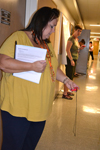 EnLiST Science Teachers Improve Pedagogy During Summer 2012 Professional Development
EnLiST Science Teachers Improve Pedagogy During Summer 2012 Professional Development
June 22, 2012
During the past couple of weeks, STEM teachers from around the state converged on campus. They could be found in Noyes conducting chemistry labs, performing physics experiments in the halls of Loomis Lab, and doing a host of nanotechnology activities, including working with gold and silver nanoparticles, in Mechanical Engineering Lab. Participants in EnLiST (Entrepreneurial Leadership in STEM Teaching & Learning), an NSF-funded Math Science Partnership ($5M/5 years), these teachers have been participating in intensive professional development over the last several weeks (and years) to gain cutting-edge scientific content, research experience in Illinois laboratories, and effective pedagogy with diverse learners.
FULL STORY
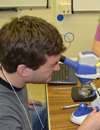 Project NEURON Creates Connections
Project NEURON Creates Connections
June 6, 2012
Speaking in front of a marker board littered with red and black writing, Barbara Hug leads a collection of 15 Illinois teachers through Tuesday morning's lesson plan. Bright, circular stickers bring life to the white walls of room 120 in Col. Wolfe School. The teachers in attendance hope for a similar effect in their classrooms—to bring them to life.
Hug, a clinical assistant professor in the College of Education, serves as a project leader for Project NEURON (Novel Education for Understanding Research on Neuroscience), along with coPIs Donna Korol from the Neuroscience Program and George Reese from MSTE (Office for Mathematics, Science, and Technology Education).
FULL STORY
 iRISE Workshop is a Hit With Local Middle School Teachers
iRISE Workshop is a Hit With Local Middle School Teachers
June 28, 2011
On Tuesday, June 28th, 2011, 24 middle school teachers from across the state came to the University of Illinois to build algae bioreactors, take apart and reassemble computers, build chemical and mechanical water filters, and explore the fluorescence of living plants. These activities were developed into classroom-ready lesson materials by a group of graduate students, faculty, and veteran teachers as part of the iRISE Project.
STORY
 It's not your parents' math class anymore!
It's not your parents' math class anymore!
November 17, 2009
LAS’ popular online program, Math Teacher Link, which has helped hundreds of instructors nationwide, is bringing math instruction into the computer era.
STORY













.jpg)















